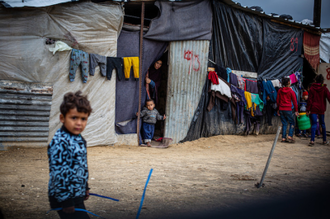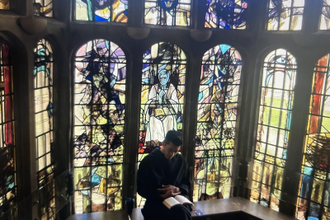One year of unimaginable suffering since 7 October attack

Displaced Palestinians are located inside temporary shelters in a camp for displaced called Rafah, in south of Gaza Strip. Image by Ismael Abu Dayyah for UNOCHA 27/01/2024.
Source: OCHA
It has been a year of unimaginable suffering, the United Nations Office for the Coordination of Humanitarian Affairs (OCHA) said today as it marked one year since Hamas and other Palestinian armed groups launched the deadliest attack in Israel's history - a horrific event that foreshadowed the devastation brought on by the Israeli response.
The toll is staggering:
According to Israeli sources, more than 1,200 Israelis and foreign nationals have been killed, including children, and nearly 5,500 have been injured.
Scores of hostages remain in Gaza, reportedly subjected to inhuman treatment, including sexual violence, exposed to hostilities and denied access to humanitarian assistance or visits by the International Committee of the Red Cross.
Entire Israeli communities have been displaced, living under the constant threat of indiscriminate rocket fire.
In Gaza, where Palestinians have already been reeling from the impact of a 17-year-old air, sea and land blockade and repeated cycles of hostilities, Israeli military operations have resulted in a catastrophe. According to the Gaza Ministry of Health, more than 41,600 Palestinians have reportedly been killed, many of them women and children, and 96,600 injured. Thousands more are missing and believed to be trapped under the rubble.
Nearly the entire population of Gaza has been displaced, many of them multiple times, with no safe place to go.
Thousands of Palestinians are arbitrarily detained, reportedly subjected to torture and other inhuman treatment and with no information on their whereabouts.
Civilians face extreme deprivation, with limited or no access to health care, food, electricity or humanitarian aid. Children have missed out on an entire year of education. Schools sheltering displaced families have been repeatedly shelled, health-care workers and hospitals have been systematically attacked, and aid convoys have been continually blocked and even shot at.
In the West Bank, the use of lethal force by Israeli forces, along with rampant settler violence and house demolitions, have led to a sharp rise in fatalities, widespread destruction and forced displacement.
"No statistics or words can fully convey the extent of the physical, mental and societal devastation that has taken place," said Joyce Msuya, the Acting Under-Secretary-General and Emergency Relief Coordinator. "But we know what must happen: The hostages must be released and treated humanely. Civilians must be protected and their essential needs met. Palestinians arbitrarily detained must be released. Humanitarian workers must be safeguarded and their work facilitated. Perpetrators must be held accountable for any serious violations of international humanitarian law. And the assault on Gaza must stop."
The past year has seen Israel blocking humanitarian access into and within Gaza, crippling aid operations. As a result, a weakened population is left to battle disease, hunger and death.
More than 300 aid workers, the vast majority from the United Nations Relief and Works Agency for Palestine Refugees in the Near East (UNRWA), have been killed in Gaza - more than in any other single crisis, making Gaza the most dangerous place for aid workers.
Despite the immense risks - including violence, looting of supplies, and access challenges - humanitarian agencies continue to deliver aid when and where they can. More than 560,000 children were vaccinated against polio during the first phase of an emergency vaccination campaign - an example of what can be achieved when aid workers can reach people in need. But such examples are few.
"It has been 12 months of unrelenting tragedy - this must end," said Ms Msuya. "Member States must wield their influence to ensure respect for international humanitarian law and human rights and compliance with the rulings of the International Court of Justice. They must also work to end impunity. An immediate ceasefire and durable peace are long overdue."


















